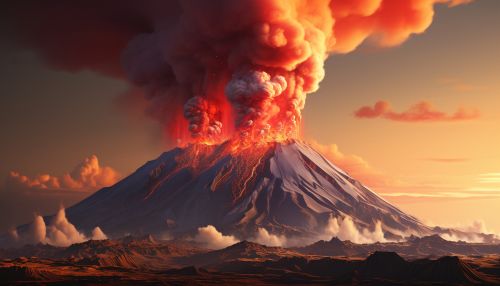Volcanic Gases and Climate Effects
Introduction
Volcanic gases are a mixture of compounds released into the atmosphere during volcanic eruptions. These gases, primarily water vapor (H2O), carbon dioxide (CO2), and sulfur dioxide (SO2), have significant effects on the Earth's climate. The impact of volcanic gases on the climate is a complex area of study within the field of volcanology and climatology, requiring an understanding of both the chemical composition of volcanic gases and the mechanisms of climate change.


Composition of Volcanic Gases
The composition of volcanic gases varies depending on the type of volcano and the nature of its magma. However, the primary constituents are water vapor, carbon dioxide, and sulfur dioxide. Other gases such as hydrogen sulfide (H2S), hydrogen (H2), carbon monoxide (CO), hydrogen chloride (HCl), hydrogen fluoride (HF), and various trace metals can also be present.
Water Vapor
Water vapor is the most abundant gas released during volcanic eruptions, typically constituting about 70-95% of the total volume of gas. It is produced when water contained in the magma is vaporized by the intense heat of the eruption.
Carbon Dioxide
Carbon dioxide is the second most abundant gas in volcanic emissions, usually making up about 10-40% of the total volume. It is produced by the decomposition of carbonate minerals in the magma and by the oxidation of carbon compounds.
Sulfur Dioxide
Sulfur dioxide is the third most abundant gas in volcanic emissions, typically constituting about 1-15% of the total volume. It is produced by the oxidation of sulfur compounds in the magma.
Volcanic Gases and Climate Change
The release of volcanic gases into the atmosphere can have significant effects on the Earth's climate. These effects can be both short-term, lasting a few years, and long-term, lasting several decades or even centuries.
Short-Term Effects
The short-term effects of volcanic gases on the climate are primarily due to the release of sulfur dioxide. When released into the atmosphere, sulfur dioxide reacts with water vapor to form sulfate aerosols. These aerosols reflect sunlight back into space, reducing the amount of solar radiation that reaches the Earth's surface and causing a temporary cooling effect. This effect is known as volcanic cooling.
Long-Term Effects
The long-term effects of volcanic gases on the climate are primarily due to the release of carbon dioxide. As a greenhouse gas, carbon dioxide traps heat in the Earth's atmosphere, contributing to global warming. However, the amount of carbon dioxide released by volcanic eruptions is small compared to human-induced emissions, so the long-term climate effects of volcanic gases are generally less significant than those of human activities.
Impact of Specific Eruptions
Certain volcanic eruptions have had particularly significant effects on the Earth's climate. These include the eruptions of Mount Tambora in 1815, Krakatoa in 1883, and Mount Pinatubo in 1991.
Mount Tambora
The eruption of Mount Tambora in 1815 was one of the most powerful in recorded history. The large amount of sulfur dioxide released into the atmosphere caused a significant drop in global temperatures, leading to what is known as the "Year Without a Summer" in 1816.
Krakatoa
The eruption of Krakatoa in 1883 also had significant climate effects. The eruption released a large amount of sulfur dioxide into the atmosphere, leading to a global cooling effect that lasted several years.
Mount Pinatubo
The eruption of Mount Pinatubo in 1991 was the second largest of the 20th century. The large amount of sulfur dioxide released into the atmosphere caused a significant drop in global temperatures for several years after the eruption.
Conclusion
The study of volcanic gases and their effects on the Earth's climate is a complex and ongoing area of research. While the short-term cooling effects of volcanic eruptions are well understood, the long-term effects of volcanic gases on the climate are less clear. Further research is needed to fully understand these effects and their implications for future climate change.
